An electrical fire often smells sharp and acrid, like burning plastic or rubber. This odor comes from overheating wires and melting insulation, which is definitely a sign to pay attention. You might even detect a fishy scent from heated materials. If you notice these smells, especially near outlets or appliances, it's crucial to act quickly! Lingering odors after shutting off the power can hint at unresolved problems that need addressing. Understanding these scents is key to staying safe, and there's even more valuable information to discover about keeping yourself and your home protected from electrical fires!
Key Takeaways
- Electrical fires often emit a burning plastic or rubber odor, indicating overheating wires and melting insulation.
- Strong chemical smells suggest heated copper wires releasing harmful substances, signaling immediate danger.
- A fishy smell may arise from the breakdown of insulation materials during an electrical fire.
- Lingering odors after power shutdown indicate unresolved electrical issues that could lead to fire risks.
- Burning wood scents can indicate escalating fire conditions, requiring urgent attention and action.
Introduction
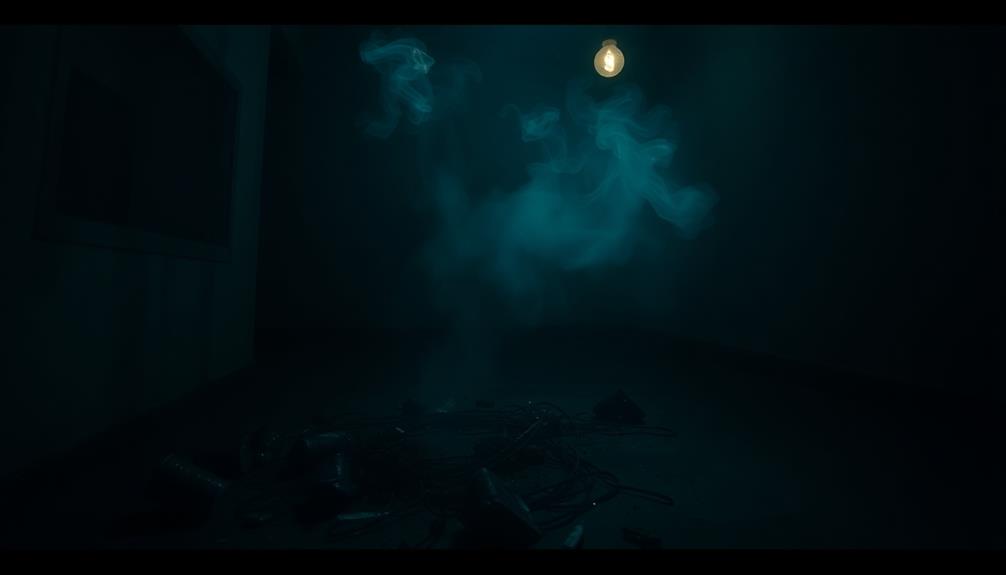
When it comes to identifying electrical fires, understanding the unique smells they produce can be life-saving. Electrical fire smells can alert you to danger before you even see flames. You might notice a scent similar to burning plastic or rubber, which often comes from the insulation surrounding wires and connectors melting. This smell can be quite strong and acrid, especially if overheating components are involved.
In contrast, the comforting warmth of a wood-burning stove provides a safe heating solution when properly maintained. As the fire starts to grow, you could also detect sharp chemical odors that might remind you of something fishy. If you catch a whiff of these smells, it's a clear sign of immediate danger and a potential fire escalation.
But don't just rely on your nose in the moment! Lingering odors after you've turned off the power can indicate unresolved electrical issues in your home. These should be taken seriously and inspected right away.
Recognizing these specific aromas is crucial for prompt action, helping you keep yourself and your loved ones safe. So pay attention to those smells—knowing what to look for could make all the difference in preventing a disaster!
Description of the Smell
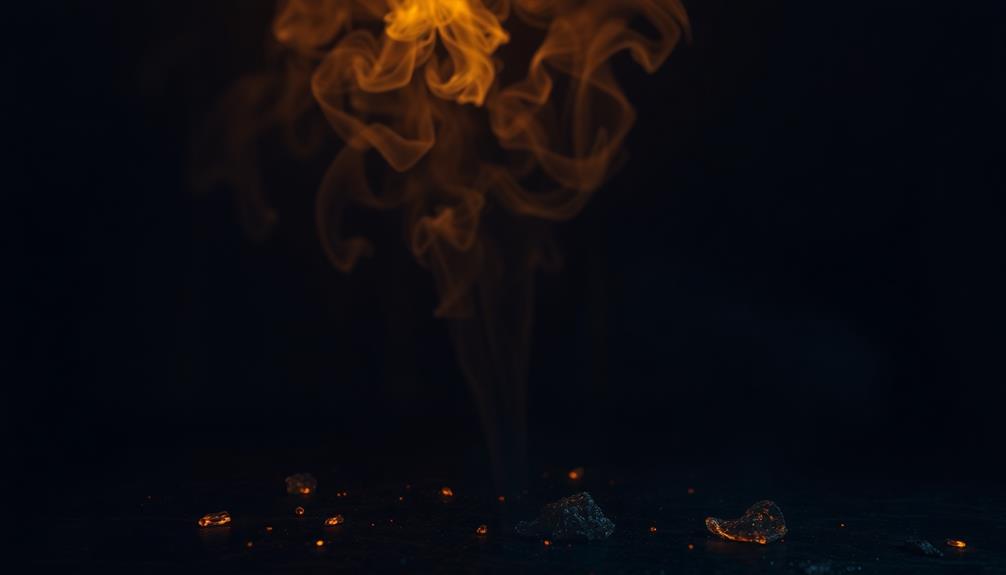
The distinct smell of an electrical fire can be alarming and is often a clear indicator of danger. When you notice an electrical fire smell, it might remind you of burning plastic or rubber. This odor often means insulation is melting from overheating wires.
You could also catch a strong chemical odor, which indicates heated copper wires are releasing harmful substances. Additionally, it's crucial to ensure that your appliances and devices are well-maintained, as improper upkeep can lead to electrical issues and potential fires. Regularly checking and cleaning air purifier filters can also help improve indoor air quality, reducing the risk of harmful odors.
Some people describe a fishy smell, which comes from melting insulation and overheated components. It's important to recognize this as a warning sign! If the fire worsens, you might start to smell something like burning wood, a clear signal that the situation is escalating.
Even after you turn off the power, lingering odors can suggest unresolved electrical issues. This means you should investigate immediately! Ignoring these smells could lead to serious problems later.
Always trust your nose—if something smells off, it's better to be safe than sorry. Stay aware of these scents, and you'll be better equipped to handle any electrical dangers that may come your way!
Source and Composition
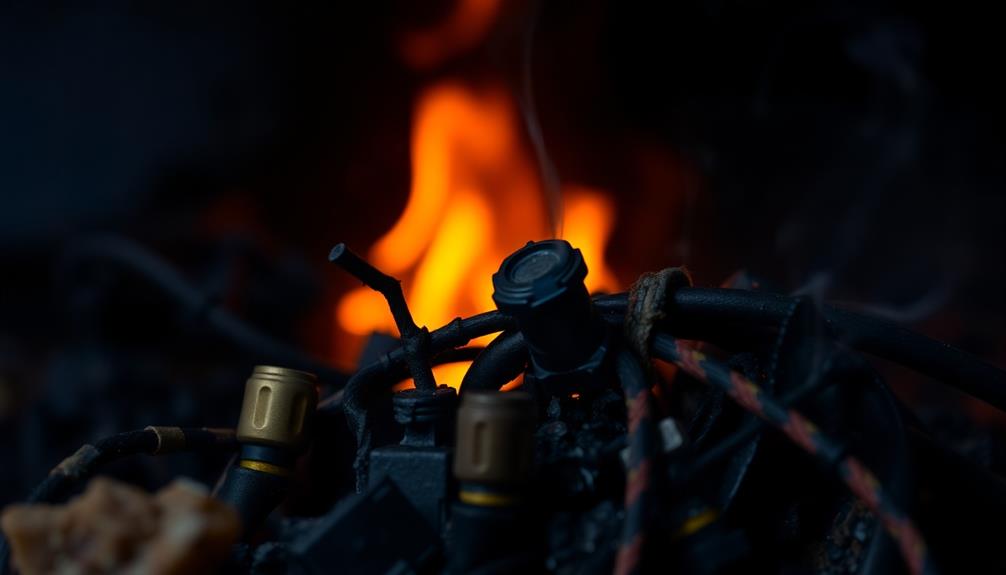
Identifying the source and composition of the smell from an electrical fire can help you act quickly to prevent a disaster.
When electrical components overheat, they often emit strong chemical odors, which can include burning plastic and burning rubber. This burning smell comes from the insulation materials on wires, commonly made of plastic and rubber. When heated, these materials release acrid fumes that are toxic and unmistakable.
Additionally, poor indoor air quality can exacerbate the effects of these harmful fumes, making it even more critical to ensure your environment is clean and monitored with an effective air purifier that targets pollutants and allergens (Health Benefits).
You might also notice a fishy odor during an electrical fire. This scent is linked to the breakdown of insulation materials and indicates a potential fire risk.
As the fire develops, you may even catch a whiff reminiscent of burning wood, especially if the flames start consuming nearby materials.
Recognizing these distinct smells is crucial for electrical safety. The combination of acrid fumes, chemical odors, and smoke serves as a warning sign of overheating wiring and the risk of an electrical fire.
Typical Scenarios or Environments
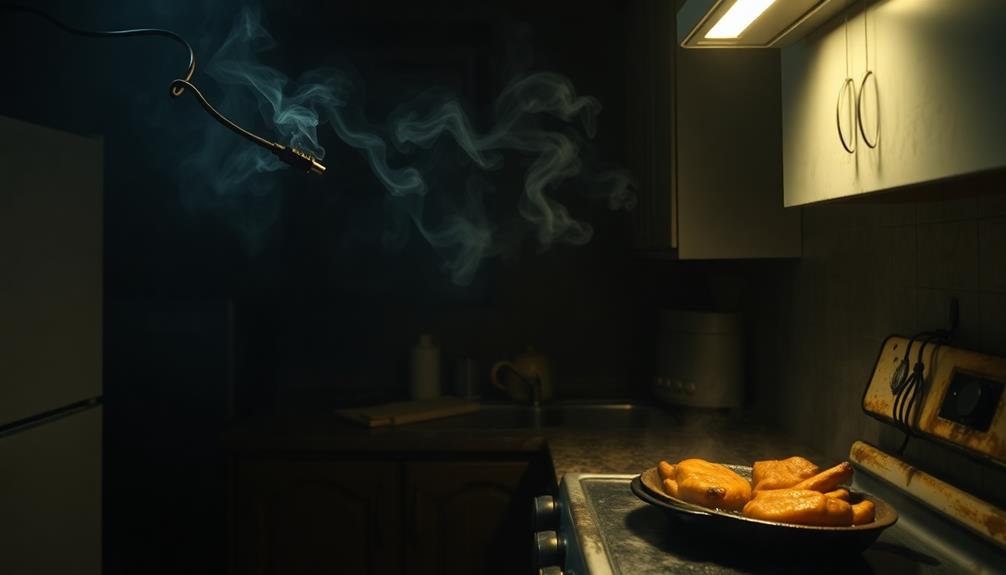
Electrical fires can happen in a variety of settings, and understanding where these incidents commonly occur helps you stay vigilant.
In your home, keep an eye out for signs of an electrical fire, like the smell of burning plastic or rubber near outlets or appliances. This smell can indicate overheating wiring or malfunctioning systems, so don't ignore it!
In commercial buildings, where multiple devices often overload circuits, you might catch distinct chemical odors. These smells signal that components are overheating, which can lead to dangerous situations.
Industrial settings can be even riskier. With heavy electrical loads and complex machinery, you might notice a fishy or acrid smell when things start to fail. This smell is a clear sign that electrical components are in trouble and a fire could ignite.
To keep your space safe, regular inspections are key. They help you spot potential hazards before they lead to those frightening smells of electrical fires.
Emotional or Cultural Associations

Many people may not realize how deeply the smell of an electrical fire can impact emotions and cultural perceptions. When you catch a whiff of burning plastic or rubber, it often triggers strong emotional responses like fear or anxiety. This makes sense, considering the serious dangers associated with electrical fires, including potential property damage and loss of life.
In many cultures, the scent of an electrical fire is recognized as a warning sign, prompting immediate action and heightened awareness. You might recall a past experience where that fishy odor filled the air, making you uneasy. It's not a smell you'd normally encounter, which can stir instincts to investigate and ensure safety.
These memories reinforce the importance of safety protocols, encouraging communities to educate each other about fire safety. By sharing these cultural associations, we foster a collective responsibility for awareness.
Health or Safety Considerations
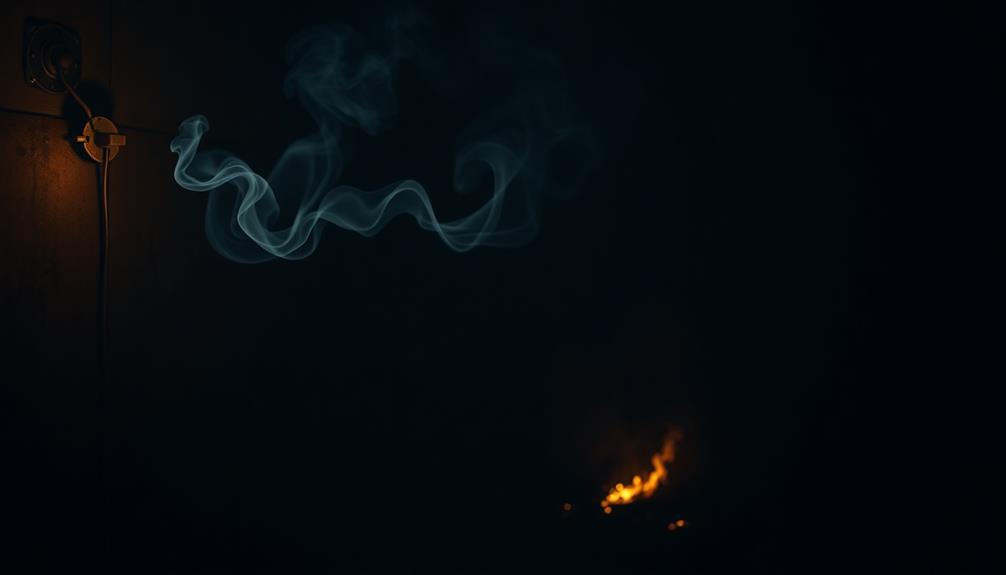
When you encounter the smell of burning plastic or rubber, it's crucial to understand the potential health risks involved.
This odor often signals an electrical fire, which can stem from overheating wires or faulty electrical circuits. You need to act quickly because these fires emit toxic fumes that can cause serious health issues.
When you breathe in these harmful gases, you risk smoke inhalation and respiratory issues. Prolonged exposure can lead to even more serious complications.
That's why immediate ventilation is essential. Open windows or doors to clear out any smoke and bad smells.
Final Thoughts
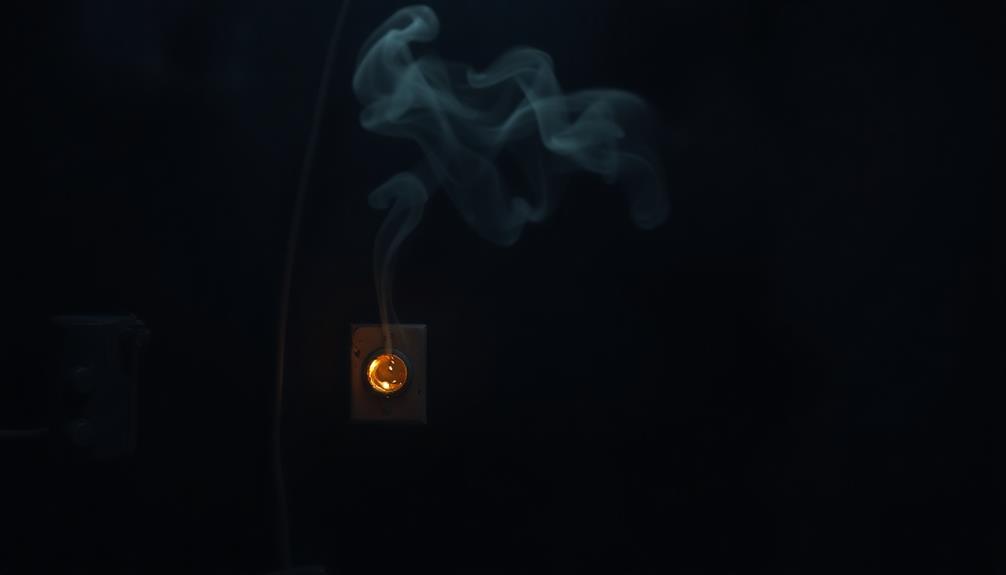
Ultimately, recognizing the signs of an electrical fire can save lives and property. The smell of burning plastic or rubber often signals that something's wrong, like melting insulation.
If you catch a whiff of a fishy odor, it might mean your electrical components are overheating. That's a critical warning you shouldn't ignore!
Strong chemical smells from heated copper wires are another sign that urgent attention is needed. You want to act fast to prevent a small issue from turning into a big fire.
Even if the power's off, lingering unusual odors can indicate unresolved problems that need a professional electrician's expertise.
Frequently Asked Questions
What Does an Electrical Burn Smell Like?
When you encounter an electrical burn, you'll likely notice a sharp, acrid smell akin to burning plastic or rubber. If it lingers, it signals potential issues that need immediate attention from a professional.
How Do I Know if There Is an Electrical Fire?
To know if there's an electrical fire, watch for flickering lights, tripping circuit breakers, or warm outlets. If you smell unusual odors or see smoke, evacuate immediately and contact a professional for help.
What Do You Smell Before an Electrical Wire Fire?
Before an electrical wire fire, you might notice a fishy odor or burning plastic scent. These smells indicate overheating or melting insulation, so if you detect them, it's crucial to investigate immediately for safety.
How Long Does It Take for an Electrical Fire to Start?
An electrical fire can start in as little as 3.5 minutes after overheating begins. If you notice warning signs like flickering lights or strange odors, don't ignore them; act quickly to prevent a disaster.









